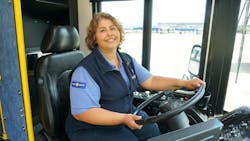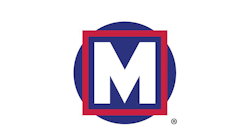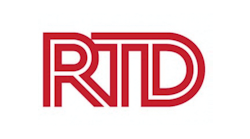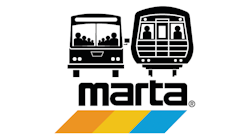Is transit recruitment a question of throwing the right amount of money at a problem?
At the national level, transit ridership has been on a steady increase during the past 52 weeks.1 While current ridership numbers represent about 55 percent of pre-pandemic numbers, transit systems across the United States have seen a roughly 35-percent increase in ridership during the past year. That ridership is steadily increasing amid the “Great Resignation” – where many employees are voluntarily leaving their companies – has produced tough times for transit agencies looking to recruit new talent and hold onto the talent they already have.
Some agencies are digging deeper into budget reserves or utilizing some of the emergency funding provided by the federal government to increase wages, as well as provide bonuses to existing and new employees.
Pandemic bonus
In April 2021, Metropolitan Atlanta Rapid Transit Authority (MARTA) said it would use approximately $13 million from a budget surplus to provide nearly three-fourths of its staff one-time pandemic payments of $3,500. MARTA said bus and rail operators, mechanics and supervisors, as well as members of the MARTA Police Department with the rank of major and below would receive the payments.
“I am extremely grateful to our frontline employees who have carried us through this pandemic,” said MARTA General Manager and CEO Jeffrey Parker at the time of the payment announcement. “These are people who could not work from home, who showed up every day to keep the buses and trains running and protect our customers, all while considering the health risks to themselves and their families.”
However, on Nov. 11, MARTA announced it would temporarily modify service to address a shortage of bus operators. All the authority’s routes will operate, but MARTA is having to adjust service to absorb a 14 percent staffing deficit. It cites COVID-19 as being the greatest threat to operator retention and recruitment. The authority does have policy that requires either a vaccination card be submitted or an employee receive weekly tests. MARTA says operators are leaving due to health concerns or being terminated due to noncompliance with the authority’s vaccination/testing policy. Additionally, absenteeism is high and MARTA believes the temporary adjustments will provide more reliability to service.
Unfortunately, the situation experienced in Atlanta is being repeated at agencies across the U.S. In the St. Louis region, the Bi-State Development Agency of the Missouri-Illinois Metropolitan District (St. Louis Metro) implemented service changes on 38 of its Missouri MetroBus routes, including suspending six routes as it too battles bus operator shortages. St. Louis Metro says it “continues to aggressively recruit and train new operators” and is offering $2,000 hiring bonus for MetroBus and Metro Call-a-Ride operators, as well as mechanics and electricians.
Hiring bonuses increase
In Denver, Colo., the Regional Transit District recognizes the compounded impact of the “Great Resignation” with the increase in ridership and is offering a $4,000 hiring bonus for bus operators, light-rail operators/engineers, body shop technicians, general repair mechanics, signal power maintainers, electro-mechanics and facilities maintenance mechanics.
“RTD is comprised of people who move people and without frontline team members the agency could not realize its mission of making lives better through connections,” Debra A. Johnson, RTD general manager and CEO said.
Capital Metropolitan Transportation Authority (CapMetro) in Austin, Texas, is offering a hiring bonus of $3,500 for some qualified candidates and has offered an agreement to the Amalgamated Transit Union, which represents CapMetro bus operators and mechanics, to significantly increase the hourly wage of operators and mechanics.
Under the increased wage, bus operators would start at $22 per hour, which represents an increase of 30 percent and an annual salary of between $54,000-$76,000. Mechanics would earn at least $31 per hour, which is up to a 13 percent increase with an annual salary of between $71,000-$84,000. Additionally, CapMetro explains the wage structure increases a staff member’s hourly rate, the longer they serve, which is designed to reward and incentivize retention.
“Our staff has been on the frontlines of the pandemic for the last two years, so this is not only a great way to support our workforce but also to ensure that we are providing equitable, competitive wages and benefits to such dedicated public servants,” said Capital Metro Deputy CEO Dottie Watkins. “I was once a bus operator myself, so I know how important it is to take care of those who make it possible for us to serve customers.”
TriMet in Portland, Ore., announced its intention in October to increase starting pay of bus operators to $21.36, but as of Nov. 29, the agency is adding a $2,500 hiring bonus. TriMet says the new wage and hiring bonus extends the agency’s menu of benefits, which includes health, dental, vision, pension and retirement plans, paid training, as well as paid leave among other benefits.
Bus operators comprise about one-third of the agency’s workforce and TriMet says it is committed to growing its team as it begins planning for the future.
------
1. Ridership statistics pulled from APTA Ridership Trends powered by Transit: https://transitapp.com/apta

Mischa Wanek-Libman | Group Editorial Director
Mischa Wanek-Libman is director of communications with Transdev North America. She has more than 20 years of experience working in the transportation industry covering construction projects, engineering challenges, transit and rail operations and best practices.
Wanek-Libman has held top editorial positions at freight rail and public transportation business-to-business publications including as editor-in-chief and editorial director of Mass Transit from 2018-2024. She has been recognized for editorial excellence through her individual work, as well as for collaborative content.
She is an active member of the American Public Transportation Association's Marketing and Communications Committee and served 14 years as a Board Observer on the National Railroad Construction and Maintenance Association (NRC) Board of Directors.
She is a graduate of Drake University in Des Moines, Iowa, where she earned a Bachelor of Arts degree in Journalism and Mass Communication.





